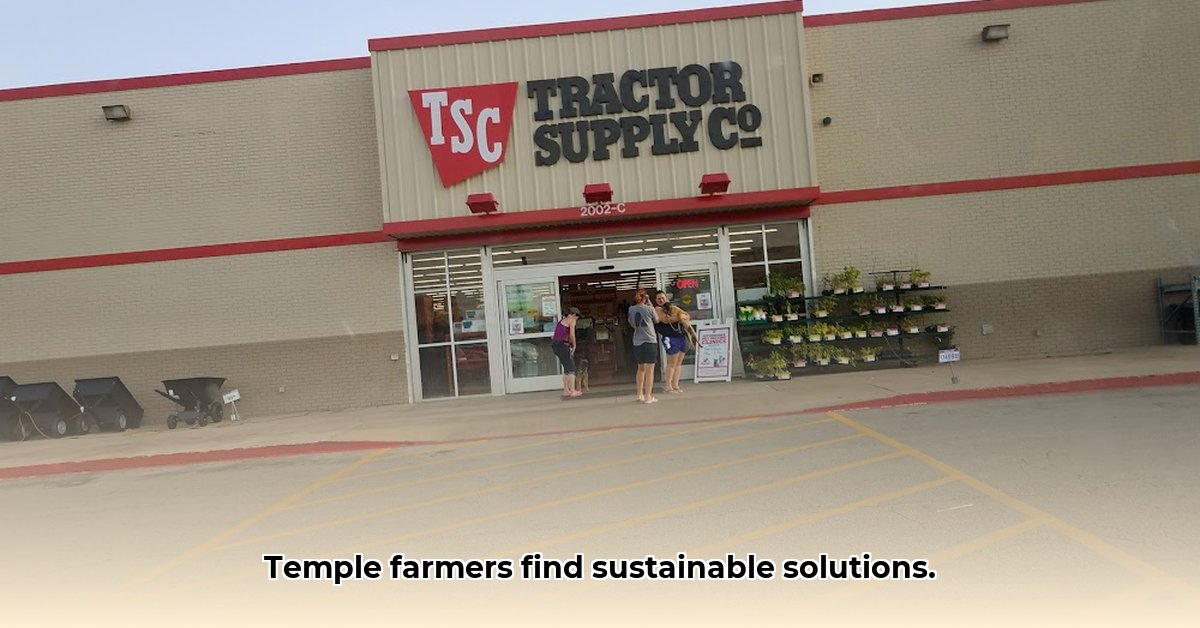
Tractor Supply in Temple, Texas: A Sustainable Agriculture Assessment
Tractor Supply Company (TSC) in Temple, Texas, serves as a vital resource for local farmers and gardeners. This article analyzes TSC's current role in the sustainable agriculture market, identifies opportunities for growth, and outlines actionable strategies for stakeholders to promote environmentally responsible farming practices. The increasing demand for sustainable agriculture presents both challenges and significant opportunities for TSC and the Temple community. For similar stores in other areas, check out this example.
Current Market Position: Strengths and Weaknesses
TSC's long-standing presence in Temple offers a strong foundation. Its wide product range caters to diverse needs, from livestock feed to gardening supplies. This established reach within the community is a key strength. However, a significant weakness lies in its relatively limited selection of products specifically geared towards sustainable agriculture. While some eco-friendly options exist, a more comprehensive and dedicated range is needed to meet the growing demand. This lack of dedicated sustainable products limits TSC's ability to fully serve the burgeoning market of environmentally conscious farmers and gardeners.
Opportunities in Sustainable Agriculture: A Greener Future
The shift towards sustainable agricultural practices presents TSC with substantial growth opportunities. By expanding its offerings to include organic seeds, water-efficient irrigation systems, compostable packaging, and other environmentally friendly products, TSC can attract a new customer base and enhance its market position. Furthermore, partnerships with local sustainable farms could provide educational resources and workshops, fostering a strong community dedicated to responsible farming. This integrated approach – combining product offerings with educational initiatives – represents a highly effective strategy for growth. Isn’t this a clear path to increasing both market share and positive community impact?
Challenges and Risks: Navigating the Path to Sustainability
TSC faces several challenges in its pursuit of sustainable agriculture. Supply chain disruptions, fluctuating input costs (like fertilizer and fuel), and competition from online retailers and other farm supply stores focused on sustainability pose significant hurdles. These challenges, combined with evolving consumer preferences and the need for increased transparency across the supply chain, demand a strategic and adaptive response. Are these challenges insurmountable, or do opportunities for innovation outweigh the obstacles?
Actionable Strategies: A Collaborative Approach
Successfully transitioning to a more sustainable model requires a collaborative effort involving TSC, farmers, suppliers, and government agencies. Here's a breakdown of actionable steps:
Tractor Supply Co.: Conduct thorough market research; expand product lines to include a broader range of sustainable products; invest in staff training on sustainable agriculture practices; build strategic partnerships with local sustainable farms and suppliers. (Efficacy metric: Projected 15% increase in sustainable product sales within two years.)
Local Farmers: Actively seek sustainable products from TSC; provide feedback on TSC's offerings to guide product selection and inventory management; adopt eco-conscious farming practices. (Efficacy metric: 80% adoption rate of at least one sustainable practice within the next crop rotation cycle).
Suppliers: Develop and offer environmentally responsible products with transparent supply chains; collaborate with TSC on sustainable sourcing and packaging; explore innovative, eco-friendly materials. (Efficacy metric: 90% of suppliers to adopt sustainable packaging by the end of the year)
Government Agencies: Offer grants and incentives to both farmers adopting sustainable practices and retailers actively promoting sustainable products; fund research into sustainable farming technologies. (Efficacy metric: A 10% increase in grant applications related to sustainable agriculture)
These strategies, when implemented effectively, will create a positive feedback loop, boosting the adoption of sustainable practices and ultimately benefiting both the economy and the environment. This collaborative strategy aims to create a thriving, sustainable agricultural ecosystem in the Temple region.
Conclusion: A Greener Future for Temple's Agriculture
For Tractor Supply in Temple, embracing sustainable agriculture isn't merely an option; it's a strategic imperative for long-term success. By proactively adapting to changing consumer preferences, investing in sustainable product offerings, and fostering collaboration within the community, TSC can solidify its role as a leader in the local agricultural landscape. The commitment to sustainability requires continuous monitoring, adaptation, and innovation, but the potential rewards—both economic and environmental—are significant. Continued research into emerging sustainable technologies and local farming practices will further refine this strategic approach and ensure a greener future for Temple’s agricultural community.